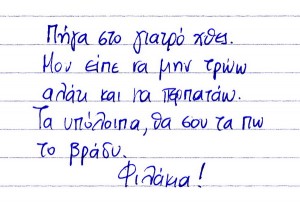The Subjunctive Mood in Modern Greek Posted by Ourania on Oct 1, 2013 in Grammar
One of the most challenging Grammar topics, even for C Level students, is the Subjunctive Mood (Υποτακτική, Ipotaktiki) .
The Subjunctive Mood is used basically to express wish, hope, expectation, intentions, and also to make suggestions and negative commands.
It is formed by placing before the verb one of the following particles and conjunctions:
| ας | να | αν, εάν | για να | όταν | άμα | μήπως | πριν | (να) μη(ν) |
+ Verb |
| as | na | an, ean | gia na | otan | ama | mipos | prin | (na) mi(n) | |
| let(‘s) | to | if | in order to | when | if | perhaps, in case | before | don’t, to not |
Tenses and use of the Subjunctive
1) Συνεχής Υποτακτική (Sinehis Ipotaktiki, Present or Continuous Subjunctive)
- It’s formed by Na + verb in the Simple Present. (Να +ρήμα σε Ενεστώτα, Na +rima se Enestota)
- It expresses a repeated action or an action with duration.
– Ο γιατρός μού είπε να περπατάω τρία χιλιόμετρα τη μέρα. / O giatros mou ipe na perpatao tria hiliometra ti mera./ The doctor told me (=suggested) to walk three kilometers per day.
– Πρέπει να πίνω μία πορτοκαλάδα κάθε πρωί. / Prepei na pino mia portokalada kathe proi. / I have to drink an orange juice every day.
– Να μη λες ποτέ ψέματα. / Na mi les pote psemata./ Don’t you ever tell lies or (you should) never tell lies.
- Expressions and phrases used with the Present Sunjunctive
– It can be used by expressions of frequency such as κάθε μέρα (kathe mera, every day), κάθε πρωί (kathe proi, every morning), κάθε βράδυ (kathe vrady, every evening) , πάντα (panta, always), συνέχεια (syneheia, constantly, all the time) etc.
– There’s a list of phrases used with the Present Subjunctive most of which are taught to intermediate students. The most common phrases that non-advanced learners can use are:
Μου αρέσει να: Μου αρέσει να χορεύω./ Mou aresi na horevo/ I like dancing.
Δε μου αρέσει να: Δεν τους αρέσει να βλέπουν τηλεόραση./Den tous aresi na vlepoun tileorasi/ They don’t like watching tv.
Μαθαίνω να: Μαθαίνουμε να οδηγούμε./ Mathenoume na odigoume/ We learn to drive.
Ξέρω να: Ξέρεις να παίζεις σκάκι;/ Xeris na pezis skaki?/ Do you know how to play chess?
2) Απλή Υποτακτική (Apli Ipotaktiki, Simple Subjunctive)
- It’s formed by Na + root of the verb in the Simple Past tense)+ endings of the present. (Να +θέμα Αορίστου+ καταλήξεις ενεστώτα, Na +thema Aoristou+katalixis Enestota)
- It expresses an action that will or won’t be accomplished.
– Με συγχωρείτε, μπορώ να μιλήσω με τον Πέτρο;/ Me sighorite, boro na miliso me ton Petro?/ Excuse-me, can I talk to Petros?
– Θέλω πολύ να σας δω το Σάββατο!/ Thelo poli na sas do to Savvato!/ I really want to see you on Saturday!
– Μην πεις ψέματα στην αστυνομία, θα μπλέξουμε!/ Min peis psemata stin astinomia, tha blexoume!/ Don’t lie to the police, we’ll be in trouble!
- Expressions and phrases used with the Simple Subjunctive
– It can be used by expressions of time such as σήμερα (simera, today), αύριο (avrio, tomorrow), απόψε (apopse, tonight) , ποτέ (pote, never), τη Δευτέρα, την Τρίτη κ.λ.π.(ti Deftera, tin Triti, on Monday, on Tuesday) etc.
– The most common phrases that can be used by learners of lower levels are:
Περιμένω να: Περιμένουμε να έρθουν οι φίλοι μας. Perimenoume na erthoun oi filoi mas/ We are waiting for our friends to come.
Έχω να: Έχω να διαβάσω για τις εξετάσεις./Eho na diavaso gia tis exetasis/ I have to study for the exams.
3) Υποτακτική Παρακειμένου (Ipotaktiki Parakimenou,Present Perfect Subjunctive)
- It’s formed by Na + verb in the Present Perfect tense. (Να +ρήμα σε Παρακείμενο, Na +rima se Parakeimeno)
- It is used to express a prior action.
– Πρέπει να έχεις φύγει πριν έρθει ο άντρας μου./ Prepei na eheis figei prin erthei o antras mou./ You have to leave (you have to be gone) before my husband comes.
– Πού είναι η Έλλη; Λες να μην έχει έρθει ακόμη;/ Pou ine I Ellie? Les na min ehei erthei akomi? / Where’s Ellie? Do you think she hasn’t come yet?
Sources:
“Τα Νέα Ελληνικά για ξένους”, Αριστοτέλειο Πανεπιστήμιο Θεσσαλονίκης, 2005.
http://www.fryktories.gr/teachingmaterial/i-ypotaktiki-kai-oi-xriseis-tis-sta-nea-ellinika-giannis-zikoydis

Build vocabulary, practice pronunciation, and more with Transparent Language Online. Available anytime, anywhere, on any device.
About the Author: Ourania
Ourania lives in Athens. She holds a degree in French Literature and a Master’s degree in Special Education for Children. Since 2008, she has been teaching Greek to foreigners.







Comments:
Rob Lee:
Ourania,
Can you tell me whether the verb συνηθίζω (even in the aorist aspect)always governs only the present (continuous) subjunctive? It seems to me it would do so, thinking it would be analogous to such uses with verbs like arxizo, synixizo, etc.
Greatly thankful for a reply!
Ourania:
@Rob Lee Hello,
Yes, the verb συνηθίζω is followed by the continuous form of the subjunctive mood.
Examples:
Δεν συνηθίζω να ξυπνάω πριν τις επτά το πρωί.
Ακόμα δεν συνήθισες να μην τον σκέφτεσαι;
Joël Landais:
I’m surprised that you should call ξυπνάω a “continuous form of the subjunctive”. I always thought ξυπνάω was the present of the indicative.
Ourania:
@Joël Landais Hello,
Να ξυπνάω is the Continuous form of the Subjunctive Mood.
Ξυπνάω στις 8 -> Present of the Indicative.
Κάθε μέρα πρέπει να ξυπνάω στις 8 -> Subjunctive.
Susanne:
Does this mean that subjunctive and indicative forms are often identical and only particles like να indicate the subjunctive mood? Six months ago I thought Greek verbs were so simple!
Top explanation, Ourania, many thanks
Ourania:
@Susanne Yes, in some cases the indicative and subjunctive are identical. However, the subjunctive mood always follows a verb. (Μου αρέσει να πηγαίνω στο μπαρ. / Συνηθίζω να τρώω νωρίς etc.)